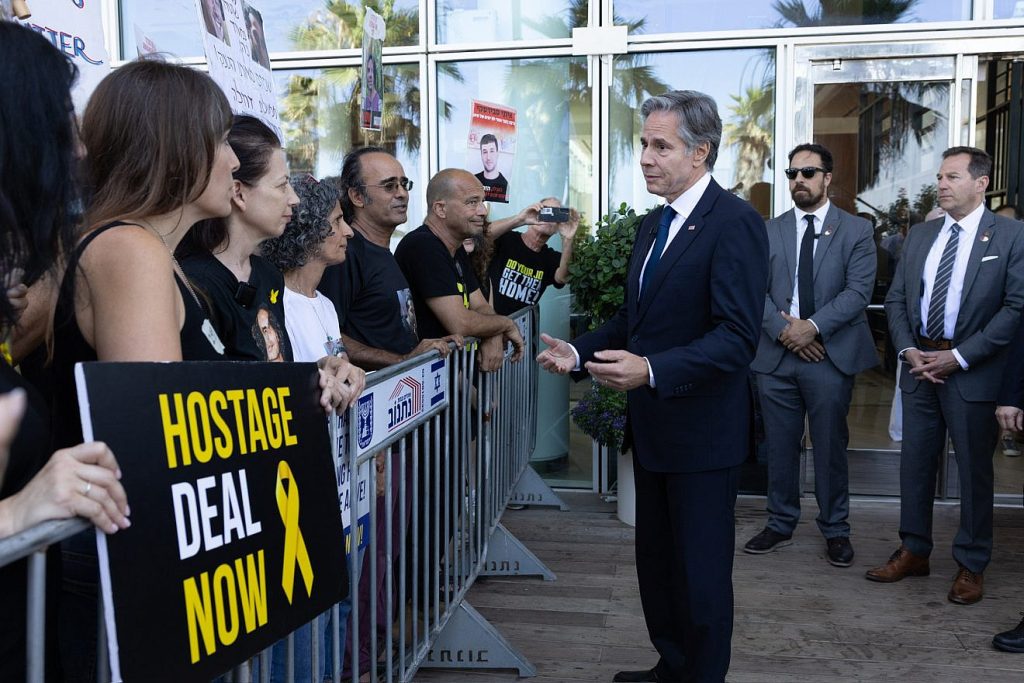
A total of 57% of Israelis oppose the U.S.-mediated deal being negotiated with Hamas, according to a JNS/Direct Polls survey of public opinion carried out on July 9. And 33% support the prospective agreement.
The contours of the agreement would require Israel to withdraw from the Netzarim Corridor that controls north-south traffic in Gaza, and from the Philadelphi Corridor that controls the Strip’s border with Egypt. In exchange for the withdrawal and the release of hundreds of terrorists from Israeli prisons, Hamas would free 18 living women and children and the bodies of 15 deceased hostages.
Seventy-nine percent of Likud voters oppose the proposal, with 14% approving and 7% not knowing.
Eighty-three percent of those identifying as right-wing reject the deal, with 10% approving and 7% having no opinion.
In contrast, 59% of voters for opposition leader Yair Lapid’s left-wing Yesh Atid Party expressed support for such a deal, with 31% opposing and 11% unsure.
Some 54% of voters for former War Cabinet Minister Knesset member Benny Gantz’s National Unity Party would support the deal, compared to 34% against it and 13% not knowing.
Meanwhile, 70% of residents of southern Israel, where Hamas perpetrated its Oct. 7 massacre of some 1,200 people, expressed opposition to such a deal, with 24% approving and the rest saying they do not know.
The JNS/Direct Poll was carried out among 606 adults aged 18 and older, representing Israel’s general population. The statistical error is 4.4%+/-95%.
An Israeli delegation led by Mossad director David Barnea arrived in Qatar on Wednesday to continue negotiations. The Israeli team also includes Israel Security Agency (Shin Bet) chief Ronen Bar, who was in Cairo earlier this week to discuss an agreement with Egyptian and American officials, and Maj. Gen. (res.) Nitzan Alon, head of the Missing and Captive Soldiers Division in the IDF.
CIA director William Burns, Egyptian intelligence chief Maj. Gen. Abbas Kamel and Qatari Prime Minister Mohammed bin Abdulrahman Al Thani are reportedly participating in the Doha talks.
The mediators are working to revive the phased ceasefire outline presented by President Joe Biden in May, which calls in its first stage for a “full and complete” six-week truce during which up to 33 Israeli hostages—alive and dead—would be exchanged for hundreds of Palestinian terrorists.
Meanwhile, Jerusalem and Hamas would negotiate the terms of the second phase, in which the remaining male hostages would be freed in return for Israel releasing additional Palestinian terrorists from jail. In the third phase, the reconstruction of Gaza would begin.
Hamas has dropped its key demand that Jerusalem commit upfront to ending the war as part of any deal, the Associated Press reported on Saturday, citing anonymous Egyptian and Hamas terrorist officials.
However, the terror group is still demanding written guarantees from mediators that the Jewish state will continue to negotiate a “permanent” ceasefire once the first phase of the agreement goes into effect, the officials noted.
On Sunday, Netanyahu outlined his red lines for a deal: The ability to resume fighting in Gaza until all war goals have been met; an end to arms smuggling from Egypt; no return of “thousands” of terrorists to Gaza’s north; and maximizing the number of living hostages released.
“The plan that has been agreed to by Israel and which has been welcomed by President Biden will allow Israel to return hostages without infringing on the other objectives of the war,” the Prime Minister’s Office said.



